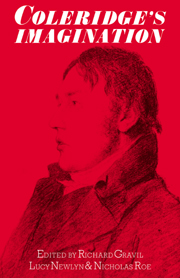Book contents
- Frontmatter
- Contents
- Pete Laver: a memoir
- Abbreviations
- Introduction
- Romantic imagination, nature and the pastoral ideal
- ‘The infinite I AM’: Coleridge and the Ascent of being
- Struggling with the contingent: self-conscious imagination in Coleridge's notebooks
- Coleridge's rejection of nature and the natural man
- The imagination of Mrs Samuel Taylor Coleridge: unknown inspiration of an unknown tongue
- ‘As much diversity as the heart that trembles’: Coleridge's notes on the lakeland fells
- ‘Leaping and lingering’: Coleridge's lyrical ballads
- ‘Radical Difference’: Coleridge and Wordsworth, 1802
- Imagining Wordsworth: 1797–1807–1817
- The Otway connection
- Imagining Robespierre
- Coleridge's Dejection: imagination, joy and the power of love
- Imagining naming shaping: stanza VI of Dejection: an Ode
- Mythopoesis: the unity of Christabel
- The languages of Kubla Khan
- Notes on the contributors
- Index
Imagining naming shaping: stanza VI of Dejection: an Ode
Published online by Cambridge University Press: 04 August 2010
- Frontmatter
- Contents
- Pete Laver: a memoir
- Abbreviations
- Introduction
- Romantic imagination, nature and the pastoral ideal
- ‘The infinite I AM’: Coleridge and the Ascent of being
- Struggling with the contingent: self-conscious imagination in Coleridge's notebooks
- Coleridge's rejection of nature and the natural man
- The imagination of Mrs Samuel Taylor Coleridge: unknown inspiration of an unknown tongue
- ‘As much diversity as the heart that trembles’: Coleridge's notes on the lakeland fells
- ‘Leaping and lingering’: Coleridge's lyrical ballads
- ‘Radical Difference’: Coleridge and Wordsworth, 1802
- Imagining Wordsworth: 1797–1807–1817
- The Otway connection
- Imagining Robespierre
- Coleridge's Dejection: imagination, joy and the power of love
- Imagining naming shaping: stanza VI of Dejection: an Ode
- Mythopoesis: the unity of Christabel
- The languages of Kubla Khan
- Notes on the contributors
- Index
Summary
But now afflictions bow me down to earth:
Nor care I that they rob me of my mirth,
But oh! each visitation
Suspends what nature gave me at my birth,
My shaping spirit of Imagination
John Spencer Hill finds compelling reasons for believing that July – September 1802 ‘were crucial months in the shaping of the theory of the Imagination’ for Coleridge, a period which is straddled by the Letter to Sara Hutchinson in April and the Ode's publication in October. The material of stanza vi remains fairly constant between the two versions, though subject to some transposition within the overall scheme of the poem, and only condensed to one stanza in the later text. Both versions reflect Coleridge's concern with the nature of imagination he was in process of exploring beyond the borders of his Ode, though the concern is as much in evidence, if rather more problematically, within the poem itself. The question of how the different modes of Coleridge's writing (poetic or theoretical) relate to each other is closely bound up with their author's sense of personal vocation, or with how an authorial voice distributes itself between overtly critical, poetic or philosophic texts. From the perspective of the Dejection Ode, Coleridge appears taken up with the problem of which ‘voice’ might best name imagination. Which voice names most essentially, and is this the same as the voice which best authorizes a description of names? What relation exists between the voices of critic, poet or philosopher, and is one voice rather than another responsible for supervising that relation?
- Type
- Chapter
- Information
- Coleridge's ImaginationEssays in Memory of Pete Laver, pp. 193 - 206Publisher: Cambridge University PressPrint publication year: 1985



